

Cyber Blockades is the first book to examine the phenomena of blockade operations in cyberspace, large-scale attacks on infrastructure or systems that aim to prevent an entire state from sending or receiving electronic data. Cyber blockades can take place through digital, physical, and/or electromagnetic means. Blockade operations have historically been considered acts of war, thus their emergence in cyberspace has significant implications for international law and for our understanding of cyber warfare.
The author defines and explains the emerging concept of “cyber blockades” and presents a unique comparison of blockade operations in five different domains—on land, at sea, in the air, in space, and in cyberspace—identifying common elements as well as important distinctions. Alison Lawlor Russell’s framework for defining cyber blockades, understanding how they occur, and considering the motivations of actors who employ them is applied with in-depth analysis of the cyber attacks on Estonia in 2007 and on Georgia during the 2008 Georgia-Russia War.
Blockade operations have occurred in cyberspace and will doubtlessly be used again in the future, by both state and non-state actors alike, because of the unique advantages of this type of attack. This book offers recommendations for policymakers contemplating or confronted by such attacks. Cyber Blockades is also a must-read for scholars and students of security studies, terrorism, substate groups, and the future of warfare.
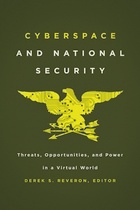
In a very short time, individuals and companies have harnessed cyberspace to create new industries, a vibrant social space, and a new economic sphere that are intertwined with our everyday lives. At the same time, individuals, subnational groups, and governments are using cyberspace to advance interests through malicious activity. Terrorists recruit, train, and target through the Internet, hackers steal data, and intelligence services conduct espionage. Still, the vast majority of cyberspace is civilian space used by individuals, businesses, and governments for legitimate purposes.
Cyberspace and National Security brings together scholars, policy analysts, and information technology executives to examine current and future threats to cyberspace. They discuss various approaches to advance and defend national interests, contrast the US approach with European, Russian, and Chinese approaches, and offer new ways and means to defend interests in cyberspace and develop offensive capabilities to compete there. Policymakers and strategists will find this book to be an invaluable resource in their efforts to ensure national security and answer concerns about future cyberwarfare.
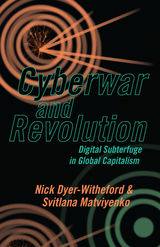
Uncovering the class conflicts, geopolitical dynamics, and aggressive capitalism propelling the militarization of the internet
Global surveillance, computational propaganda, online espionage, virtual recruiting, massive data breaches, hacked nuclear centrifuges and power grids—concerns about cyberwar have been mounting, rising to a fever pitch after the alleged Russian hacking of the U.S. presidential election and the Cambridge Analytica scandal. Although cyberwar is widely discussed, few accounts undertake a deep, critical view of its roots and consequences.
Analyzing the new militarization of the internet, Cyberwar and Revolution argues that digital warfare is not a bug in the logic of global capitalism but rather a feature of its chaotic, disorderly unconscious. Urgently confronting the concept of cyberwar through the lens of both Marxist critical theory and psychoanalysis, Nick Dyer-Witheford and Svitlana Matviyenko provide a wide-ranging examination of the class conflicts and geopolitical dynamics propelling war across digital networks.
Investigating the subjectivities that cyberwar mobilizes, exploits, and bewilders, and revealing how it permeates the fabric of everyday life and implicates us all in its design, this book also highlights the critical importance of the emergent resistance to this digital militarism—hacktivism, digital worker dissent, and off-the-grid activism—for effecting different, better futures.

A bold new theory of cyberwar argues that militarized hacking is best understood as a form of deconstruction
From shadowy attempts to steal state secrets to the explosive destruction of Iranian centrifuges, cyberwar has been a vital part of statecraft for nearly thirty years. But although computer-based warfare has been with us for decades, it has changed dramatically since its emergence in the 1990s, and the pace of change is accelerating.
In Deconstruction Machines, Justin Joque inquires into the fundamental nature of cyberwar through a detailed investigation of what happens at the crisis points when cybersecurity systems break down and reveal their internal contradictions. He concludes that cyberwar is best envisioned as a series of networks whose constantly shifting connections shape its very possibilities. He ultimately envisions cyberwar as a form of writing, advancing the innovative thesis that cyber attacks should be seen as a militarized form of deconstruction in which computer programs are systems that operate within the broader world of texts.
Throughout, Joque addresses hot-button subjects such as technological social control and cyber-resistance entities like Anonymous and Wikileaks while also providing a rich, detailed history of cyberwar. Deconstruction Machines provides a necessary new interpretation of deconstruction and timely analysis of media, war, and technology.
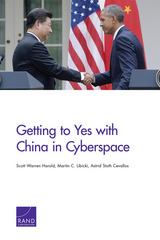
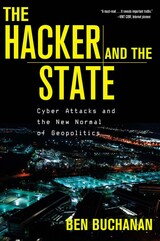
“A must-read…It reveals important truths.”
—Vint Cerf, Internet pioneer
“One of the finest books on information security published so far in this century—easily accessible, tightly argued, superbly well-sourced, intimidatingly perceptive.”
—Thomas Rid, author of Active Measures
Cyber attacks are less destructive than we thought they would be—but they are more pervasive, and much harder to prevent. With little fanfare and only occasional scrutiny, they target our banks, our tech and health systems, our democracy, and impact every aspect of our lives. Packed with insider information based on interviews with key players in defense and cyber security, declassified files, and forensic analysis of company reports, The Hacker and the State explores the real geopolitical competition of the digital age and reveals little-known details of how China, Russia, North Korea, Britain, and the United States hack one another in a relentless struggle for dominance. It moves deftly from underseas cable taps to underground nuclear sabotage, from blackouts and data breaches to election interference and billion-dollar heists.
Ben Buchanan brings to life this continuous cycle of espionage and deception, attack and counterattack, destabilization and retaliation. Quietly, insidiously, cyber attacks have reshaped our national-security priorities and transformed spycraft and statecraft. The United States and its allies can no longer dominate the way they once did. From now on, the nation that hacks best will triumph.
“A helpful reminder…of the sheer diligence and seriousness of purpose exhibited by the Russians in their mission.”
—Jonathan Freedland, New York Review of Books
“The best examination I have read of how increasingly dramatic developments in cyberspace are defining the ‘new normal’ of geopolitics in the digital age.”
—General David Petraeus, former Director of the CIA
“Fundamentally changes the way we think about cyber operations from ‘war’ to something of significant import that is not war—what Buchanan refers to as ‘real geopolitical competition.’”
—Richard Harknett, former Scholar-in-Residence at United States Cyber Command

Cyberattacks are one of the greatest fears for governments and the private sector. The attacks come without warning and can be extremely costly and embarrassing.
Robert Mandel offers a unique and comprehensive strategic vision for how governments, in partnership with the private sector, can deter cyberattacks from both nonstate and state actors. Cyberdeterrence must be different from conventional military or nuclear deterrence, which are mainly based on dissuading an attack by forcing the aggressor to face unacceptable costs. In the cyber realm, where attributing a specific attack to a specific actor is extremely difficult, conventional deterrence principles are not enough. Mandel argues that cyberdeterrence must alter a potential attacker’s decision calculus by not only raising costs for the attacker but also by limiting the prospects for gain. Cyberdeterrence must also involve indirect unorthodox restraints, such as exposure to negative blowback and deceptive diversionary measures, and cross-domain measures rather than just retaliation in kind.
The book includes twelve twenty-first-century cyberattack case studies to draw insights into cyberdeterrence and determine the conditions under which it works most effectively. Mandel concludes by making recommendations for implementing cyberdeterrence and integrating it into broader national security policy. Cyber policy practitioners and scholars will gain valuable and current knowledge from this excellent study.
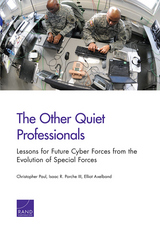
READERS
Browse our collection.
PUBLISHERS
See BiblioVault's publisher services.
STUDENT SERVICES
Files for college accessibility offices.
UChicago Accessibility Resources
home | accessibility | search | about | contact us
BiblioVault ® 2001 - 2024
The University of Chicago Press









